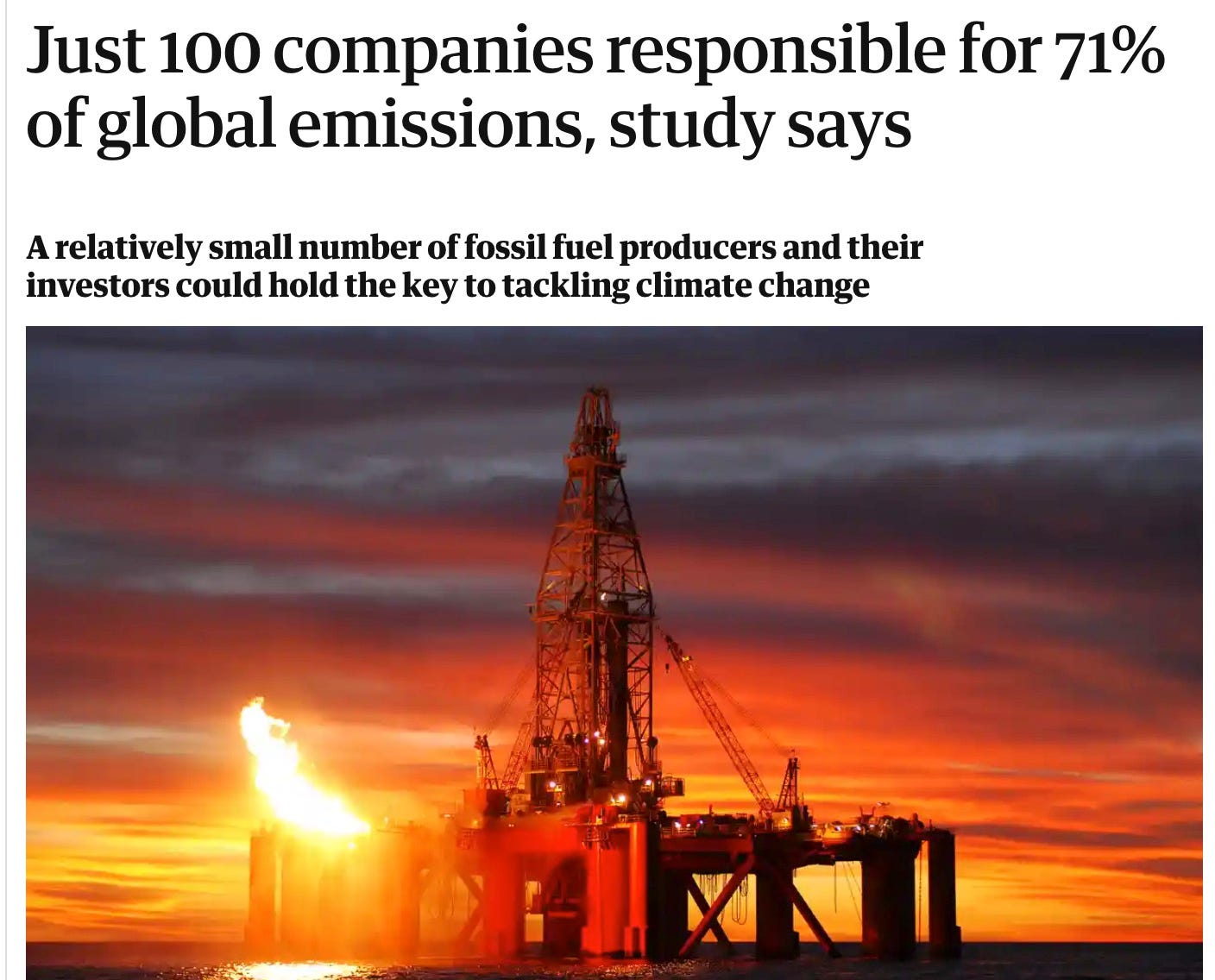Spreading the Blame Around: The Ethical and Tactical Pitfalls of Climate Responsibility
A guest post from Sami Grover.
Sami Grover is a writer and a friend who has also written a just-published book which I was afraid to read, worried that it would change the way I think about my own. It didn’t! I asked him to do another guest post.
“If everyone is guilty, then no one is to blame, and someone is to blame... Some people, some companies, some decision makers in particular know exactly what priceless values they have been sacrificing to continue making unimagin- able amounts of money, and I think many of you here today belong to that group of people.”
When Greta Thunberg appeared before the world’s financial elite (and Bono) at Davos, she directly addressed the main problem with platitudes about shared responsibility. It’s not that ordinary Western citizens do not bear some responsibility for the crisis we are in—we absolutely do—it’s just that focusing on our own responsibility as individuals runs the risk of letting others off the hook.
And yet. And yet… As Lloyd has argued forcefully in Living the 1.5 Degree Lifestyle, we are not exactly innocent bystanders in the equation. Here he is picking apart the “100 Companies are Responsible for 70% of Emissions” trope:
“The problem with this is that those 100 companies don’t directly produce much CO2; they sell fossil fuels that are burned for energy, which releases CO2. It’s their customers, you and me, who turn their product into emissions.”
Like it or not, we are accomplices or enablers in this crisis. Yet we need to be very careful and strategic in how we talk about morality, duty and responsibility.
According to Jennifer Jacquet—author of Is Shame Necessary?— there is an opportunity cost in spreading the blame around. Much like antibiotics, these strategies work best when they are held in reserve. As Jacquet argues in her book, we need to be thinking about shame and shaming not simply in terms of what or who is morally deserving of shame. Perhaps more importantly, we need to also be thinking in terms of whether or not we are likely to achieve results.
Our own feelings of guilt and shame—common among the climate conscious—can be a mixed blessing. On the one hand, they can be a powerful driver to action. On the other hand, they can cause us to focus inwards, meaning we fix our gaze on correcting our shortcomings, rather than on seizing opportunities for wider scale change.
There are parallels here with the fight for racial justice.
Back in 2019, writing for a progressive online Christian publication called The Salve, Ajah Hales challenged the utility of white guilt. In doing so, she offered a provocative analogy in which she asked us, as readers, to imagine we’ve come across a badly injured assault victim. As we spring into action to help them, we discover we’ve left our cell phone at home and, to make matters worse, we also remember that we never did take that CPR class we’d been planning to enroll in.
What, she asked, should our next step be?
“Perhaps you would run to the nearest store or house and ask to use their phone. Maybe you would check to make sure the person is still breathing. Maybe you would check his/ her pockets for a phone. How much time would you spend pacing beside the person as they lay dying, berating yourself for not having your phone and never taking a CPR certification? Probably none, right? Because this is a life or death situation; it’s not about you, and your guilt is worthless in this scenario.”
If you’re reading this article—and something tells me you are—then there’s a very good chance you’re in the top 10% of global wealth. And if you’re in the top 10% of global wealth, then, like me, your carbon footprint is an order of magnitude higher than many of your fellow travelers on this beautiful, spinning rock.
You and I have a moral duty to act. We also have a moral duty to be strategic in how we expend our energy. There are almost certainly steps you can take to make significant reductions in your carbon footprint—and I encourage you to take those steps. I also encourage you, however, to make those steps count. Wherever you are on the spectrum of sustainable living, the single most important thing you can do is to demand systems-level interventions that legislate harmful products and harmful behaviors out of existence.
Sami Grover is a brand specialist, environmental writer and author of We’re All Climate Hypocrites Now: How Embracing Our Limitations Can Unlock the Power of a Movement. He once vowed never to fly again, and then he fell in love with someone on the other side of the planet.

